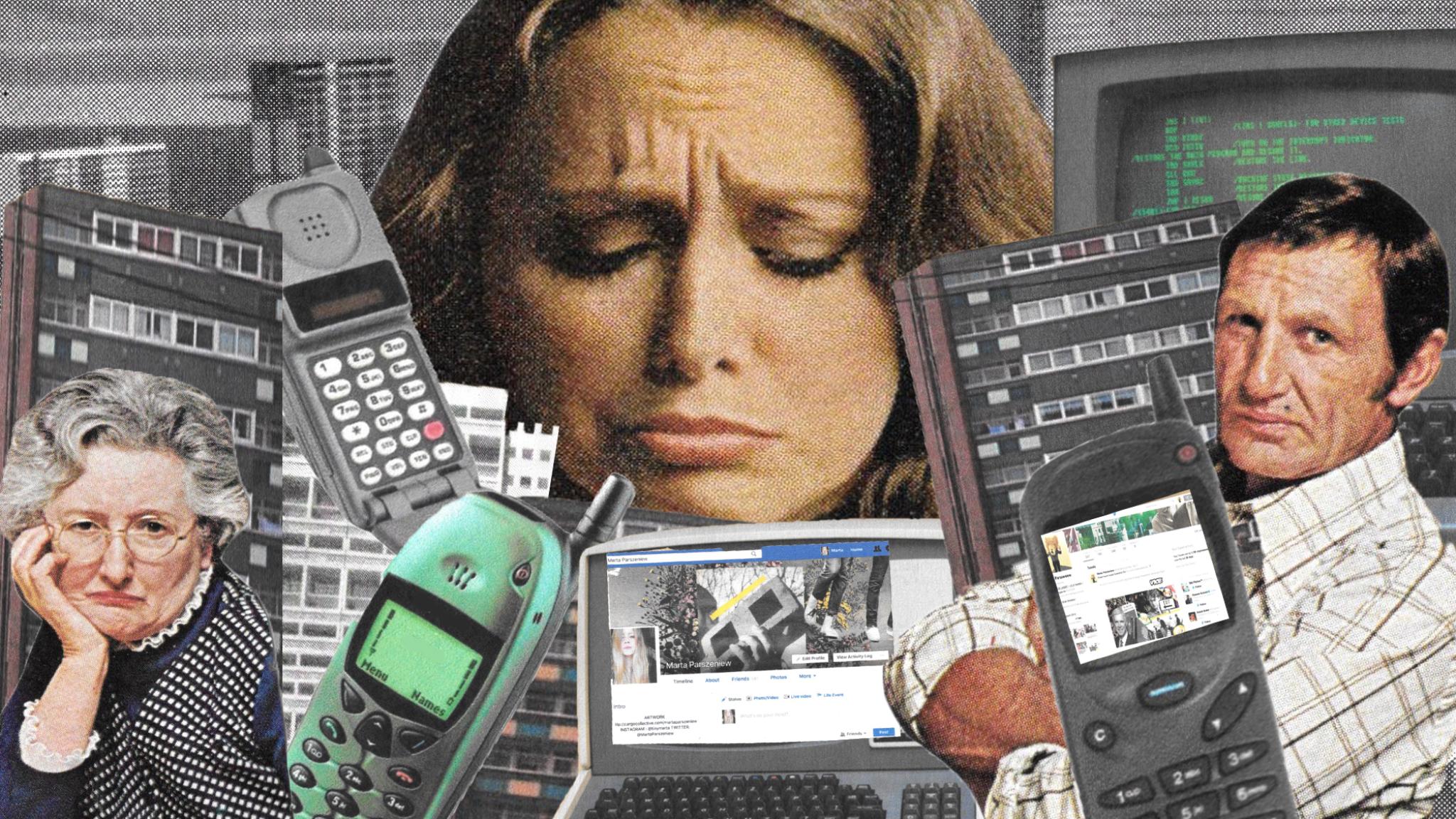Not Going Online Is the New Going Online
Not Going Online Is the New Going Online
We all know technology is making us miserable but haven't worked out a solution. Now the biggest counter-culture movement since vegetarianism is forming.
It's time to call it: The internet has stopped being fun. Like all good love affairs, it started exciting. We used to stay up late and laugh together, now it's just helping us to argue for longer. The long idle summers of Albino Black Sheep and Chris Crocker turned into a gray unceasing winter of big data billionaires and live-streamed tortures. We're under surveillance, unable to concentrate, we're not present, we can't sleep—we can't even cross the street anymore. It's the reason you can't finish a book and why department stores already know that you've been thinking about buying a Nutri-Bullet. Yet—like so many terrible relationships—despite all of the energy-sapping, data-mining exhaustion of it all, we can't quit.
What's worse is: we know all this. You hardly need another book, another inflamed headline, another podcast to detail the multitude of ways in which your phone is ruining your life. Yet despite all that, we only seem capable of taking the conversation halfway. We've diagnosed the problem, but for a generation that prides itself on being "woke, of course, " we've been surprisingly nonplussed about coming up with a solution to what is surely the most universally pervasive issue of our lifetime.
We've failed to address the problem mostly because we don't know where to start. As we see it, the internet is like a life support system. Deciding one day to pull it from our veins would leave us gasping frantically before plunging into an endless, lonely abyss. We can't return to a world without it, and to remove ourselves from the world with it—by becoming Amish—feels like a stretch. We could delete all of our accounts, but how would we find out if we've been invited to get birthday drinks?
The continuation of the current slide is not inevitable. After all, the iPhone is only a decade old, and the worldwide web only 25. What we've broadly come to consider as the beginning of a decline could equally turn out to be a period of technological naivety—the time before we truly grasped what we were prepared to sacrifice and what we wanted in return. Tech, of course, shapes the future, but it's also totally conceivable that a struggle to redefine the role it plays in our lives will take place.
Small but meaningful changes are already taking place. Policy-makers are debating whether or not smartphones have a place in the classroom, restaurants are banning them at dinner tables and businesses are demanding they stay out of meetings. The battle between music venues and smartphones is a long and storied one—notably tech company Yondr have even created phone cases which lock once people enter the venue's designated "phone-free zone." As of March this year, driving while texting will cost the driver a $250 fine and six points on their license in the UK. All across public life, the assumed omnipresence of technology is being challenged.
Individually, we've been addressing it as well. The idea of a "digital detox" dates back to the days of the Blackberry. Classically they're centered around idyllic, phone-free retreats, but most organizations also promote ways of building a positive relationship with technology in the real world. When I contacted Tanya Goodin, founder of the digital detox organization Time To Log Off, about her retreats, she said they were similar to other kinds of rehab: People know they've got a problem and want help. "At the end, when we give them their phones back, there's always one person who says they don't want it," she says, laughing.
Crucial to their success is how digital detoxes have married the spheres of technology and the burgeoning wellness industry. With the rise in popularity of mindfulness apps like Headspace, the fashionability of meditation has brought with it a keen interest in the benefits of going phone-free. There are now—somewhat ironically—a wealth of apps designed to help people use their phones and computers productively—from Self Control, which allows you to block certain websites for a certain amount of time, to Stay On Task, which simply nudges you to check that you're getting on with whatever it is you're supposed to be doing. Silicon Valley has led the way elsewhere, pioneering the idea of a literal "Digital Sabbath"—insisting employees take a day of technology-free rest on the weekend.
Individually these policies, trends, and fads don't amount to much of a revolution. Yet they point to a potential. So far they are disparate ideas, hanging threads waiting for a broader intellectual movement to collect them. Yet the blueprints are there for that as well. Making a big deal about leaving Facebook used to be the preserve of high school art students who stayed offline so nothing could distract them from listening to introspective acoustic guitar music on their parents' record player.Yet, increasingly, as ideas of technology addiction have become normal topics of conversation—as publications ranging from the Guardian to Breitbart have reported on the links between social media and loneliness—leaving social networks, temporarily or for good, has become a more conventional decision for young people to take.
If "I'm not on Facebook" used to be a hipsterism, it increasingly looks set to become a mainstream concern. By 2013 the number of adults who said they'd taken extended or permanent breaks from Facebook sat at around 61 percent. As Facebook continues to raise eyebrows over its privacy policies, the ground for a continuing exodus grows more fertile. It's totally plausible, if not logical, to see how quickly leaving social media could be adopted by some as a counterculture.
There is a transgressive quality to being a young person in 2017 and turning your back on your phone. In his book Solitude, Canadian writer Michael Harris positions living without the constant distraction of notifications as a spiritual awakening waiting to happen. He defines internal thought as an art; a discipline that needs to be cultivated in a world figured against it. "Radical is the word," he tells me over Skype. "You have to be comfortable with a certain quality of rudeness if you're going to remove yourself from group culture."
Harris' book isn't preachy; rather, it recasts small lifestyle changes as part of a struggle to regain that sense of self. For example, Harris tells me, he pushes back the moment he first checks his phone, giving himself as long as possible at the start of the day before entering the cloud. It's a small gesture, but it's the sort of practical change that points to how control can be regained. "These are the ways we have to curate our hours," he explains. "I think it's indicative of the level of addiction we're stuck with. You can't just go on a digital detox and then be fixed. We're so marinated in this, we have to struggle against it on a daily if not hourly basis."
It speaks to a long overdue conversation we still haven't properly had in our society—one which understands that cultivating a healthy relationship with your phone is as important as using condoms or eating your greens. "If you look at the 1950s and 1960s food culture in North America, there was this super-abundance of food," Harris continues, "but we weren't smart about how we ate, and then as diabetes and obesity levels shot up we had to stop and think. In the same way, we're not going to eat Kraft dinner every night for the rest of our lives, we are starting to say: What's a healthy media diet?"
What's required for that to happen is for people to start thinking about technology use as a public health issue—and is that really so hard to imagine? Campaigners are already fighting to make mental health education compulsory in UK schools; managing compulsive social media use is surely a logical extension of this. You only need to look at the increasing popularity of mindfulness exercises in British schools to see how effective ideas of wellness can prove.
Dr. Richard Graham is a child and adolescent psychiatrist. Around 12 years ago he began dealing with unprecedented cases of young people suffering from mental health issues as a result of excessive technology use. In 2010 he launched the UK's first specialist service for technology addiction, and in the years since he has become a leading expert on dependency and rehabilitation. When I speak to him over the phone, he agrees our relationship with technology is problematic but is less sure we've reached a breaking point. "I don't think we know what our limits are yet," he explains. "I started out in the era of a single platform. Now it's wearables. It's so entwined, it's far more complex."
He believes current generations have to think seriously about our future relationship with technology. That said, he doesn't think abstinence is the way forward, rather that the focus should be on equipping the next generation to "develop the internet in an ethical way." However, he agrees that a cultural shift in some form is likely. "I expect we'll see tribes who go down that route," he suggests, "parents seeking schools where the iPad in the nursery is withheld."
The argument, of course, goes that these ideas have been about for a while now. Digital detox getaways have so far failed to ignite any meaningful societal change. Convincing people that using Twitter too often isn't good for them is unlikely to spark a reaction of any substance. Up until fairly recently, the damage was quantified as personal—fears of using your phone too much related to your own wellbeing. Yet the context is changing. From high-profile intelligence leaks to revelations of widespread data-mining, our obsessive relationship with screens has suddenly taken on a political dimension. Suggestions of smartphones listening in on conversations have become commonplace rumor and "fake news" has entered our vernacular. Gradually a distrust of technology has transitioned from the dystopic to the everyday.
Whether it's been used in connection with Brexit, or simply to sell car insurance, the exploitation of our data has exposed just how frighteningly unregulated the internet is. Corporations know what you want to buy before you've even googled it, and governments are able to build intimate pictures of their citizens, either directly or by outsourcing to private surveillance companies. Whatever we thought we were agreeing to when we created our Facebook accounts, it surely wasn't this.
"We're setting ourselves up for a place where there's no regulation and no oversight and there's no discussion. We're not choosing, at all."
Manoush Zomorodi is the host and managing editor of Note to Self, a podcast self-described as the "tech show about being human." She recognizes our current situation as a state of mass paralysis, a strange unspoken collective sense that something bad is happening but we don't really know what we can do about it. "We love having the convenience of living online, but we hate the feeling that we have no say over where our personal information goes, or who is looking at it, so we just feel kind of gross most of the time," she explains during a conversation over Skype. "We click yes to some terms of service and think. 'I'm a terrible person, I didn't read them,' or, 'I did, but I clicked yes anyway.' How did we get to the point where in order to download an app you have this moment where you feel like a bad person?"
That compromise, that pact, is what Zomorodi calls the "privacy paradox." It's the name of a project Note to Self launched earlier this year that sought to equip their listeners with the tools and information to reclaim their personal privacy in a world where, as it stands, both corporations and governments have unfettered access to everything. "We're setting ourselves up for a place where there's no regulation and no oversight," Zomorodi continues, "and there's no discussion. We're not choosing here, at all."
Like Solitude, The Privacy Paradox project offers the practical first steps towards resolving a larger problem. "It was shocking for me that people didn't know that each app has its own privacy settings," Zomorodi tells me. "One guy who contacted us was like, 'Holy shit, I had no idea that my flashlight app was collecting my location, had access to my microphone, and all of my contacts!' Then you ask, why was it free, or 99 cents? Well, probably because it is selling all of its users' data to marketers."
What's surprised Zomorodi the most is just how many people are ready for these ideas, and how quickly they can catch on when communicated effectively. As soon as people see their data as something they can influence, they want to demand more from social networks and governments who are currently operating in a totally unregulated digital sphere. "It's a cultural shift that needs to happen—zit requires us to be not OK with this en masse," she tells me. "You have to start somewhere. A little bit of autonomy. So we're starting with conversations, little things, deleting apps." And it's working. Zomorodi initially predicted somewhere in the region of 200 people would sign up for the project. The first wave attracted 20,000.
It's this dimension that signals the real potential of a future backlash. The more social networks, governments, and corporations are shown to be complicit in manipulation, the less desirable possessing a Facebook account becomes. Politicizing our relationship with technology will most likely prove the most effective way of changing it. Encrypted messaging services like Signal might not seem interesting now, but position them as tools with which minorities can protect themselves in Trump's America, or methods for avoiding May's "Snoopers Charter," in the UK and they take on powerful new meanings—suddenly an unheard-of app becomes a source of anti-establishment empowerment.
The seeds for this are already being sown—in the reactions against Facebook's sharing of users' moods with companies. As the world begins to further question the role technology has played in recent campaign shocks, and more generally how excessive internet use has facilitated a voluntary surveillance state, it seems inevitable that people will begin to question whether it's worth it for the group chat.
LISTEN: The VICE Podcast – Can You Cure Your Social Media Addiction?
Where we're at now feels a bit like where vegetarianism was a couple of generations ago. Experts were beginning to tell us meat was bad for our bodies and bad for our environments, but we ate so much of it that we struggled to envisage life without it. Then, slowly but surely, with each tofu meatless product and every violent documentary, vegetarianism became a counterculture. Given the mental and ethical ramifications of our current relationship with technology, similar developments are totally plausible. If anything, we should find it easier; it's not like we've been battling with centuries of meat-eating. We've been at this for less than 20 years.
Or take smoking. Only a generation ago you could have smoked a cigarette in Pizza Hut. Now, it's unlikely many people would smoke in their own cars. It's been a slow process of education and persuasion, but ultimately our culture changed. The materials for a healthy relationship with technology are there also. Just as smoking indoors was the beginning of the end, who's to say penalties for driving while texting won't spark an interest in how we can influence the interplay between technology and public life?
Like all countercultures, unplugging will probably start small and meaningful, and end up being sold by the very corporations it set out to rebel against. Like McDonald's making salads, Facebook is already curating news-outlets, guaranteeing authenticity in response to the "fake news" dilemma.
Zomorodi is confident about the future, simply due to the reception her podcast continues to receive. "I think people are looking for a community," she explains. "They are looking for permission. They want to understand it. To me, this is the future of digital literacy. It's not about learning how to code; it's about learning how these very powerful tools are changing how we exist culturally."
Many writers have already hypothesized a neo-Luddite reaction to the automation of industry. Writing for the New Statesman in 2014, Bryan Appleyard saw "Luddism in practice and in theory" as "back on the streets", tracing a lineage from the American anarchist Ted Kaczynski, known as the Unabomber, to the hands of the Parisian taxi drivers who vandalized Uber vehicles.
In 2013, economist Paul Krugman wrote an article titled "Sympathy for the Luddites" for the New York Times, connecting the textile workers of 19th century Leeds with the labor forces of today who are facing a future of increasing redundancy as automation comes to play an increasingly central role in production—something George Monbiot has also recently explored with regards to education.
The conflict between labor and technology is considered by many an inevitability, yet in a world of data-mining and technology addiction, where the lines between producer and consumer are becoming increasingly blurred, the need to conceive of a socio-cultural equivalent of this tension becomes more pressing. This isn't about saying "technology is bad." Rather, it's influencing the ways in which it develops—democratizing progress, so to speak.
This isn't a speculation that the people will one day rise up and throw their phones in the bin. This backlash probably won't take the form of Apple Stores being smashed to pieces by Politics students, or tech-free cults establishing settlements in the Lake District. Truthfully, it might not happen at all. Yet, it seems reasonable to assume that the more these ideas grow in the collective consciousness—the more people realize exactly what they've sacrificed in exchange for convenience—the more likely they are to indulge that most popular of rebellious reflexes, and take back control.
Ref: www.vice.com


